Even with the lifting of pandemic lockdowns, many people still choose to stay and work from home. So if you’re thinking about ways to earn moneyfr ...
A good starting point is to research your local market to identify opportunities.
We earn commissions if you shop through the links below. Read more
Written by: Carolyn Young
Carolyn Young is a business writer who focuses on entrepreneurial concepts and the business formation. She has over 25 years of experience in business roles, and has authored several entrepreneurship textbooks.
Edited by: David Lepeska
David has been writing and learning about business, finance and globalization for a quarter-century, starting with a small New York consulting firm in the 1990s.
Published on November 11, 2021

Investment range
$5,655 - $9,910
Revenue potential
$24,000 - $260,000 p.a.
Time to build
0 - 4 months
Profit potential
$14,000 - $52,000 p.a.
Industry trend
Growing
Commitment
Flexible
Important elements to think about when starting your lawn care business are outlined here:
You May Also Wonder:
How much should I charge as an hourly rate for lawn care services?
The average per hour rate for most lawn care services is about $40-$60. For riding lawn mowers, that jumps to $100-$120.
How should I get lawn mowing clients?
Physical and digital marketing is necessary to get your business name out there. Tap into as many local channels (signage, storefronts, flyers, cards, etc.) and social media platforms (Facebook, Twitter, Instagram) as you can to contact as many prospective clients as possible. You could also go door-to-door in your target area, introduce yourself and your services and turn on the charm, like in the old days.
How long does it take to mow an acre?
Mowing times hinge on the type of mower. Here’s a handy table breaking down common mowers and their coverage speed:
| Size of mower: | Time to mow 1 acre: |
|---|---|
| 22-inch push mower | 1 hour 39 minutes |
| 30-inch push mower | 1 hour 13 minutes |
| 38-inch lawn tractor | 34-57 minutes |
| 42-inch lawn tractor | 31-52 minutes |
How profitable is a lawn care business?
While a well-managed lawn care business can be profitable, it’s important to consider factors such as equipment and maintenance costs, labor expenses, marketing efforts, and seasonal fluctuations.
What are some eco-friendly practices I can implement in my lawn care business?
To make your lawn care business more eco-friendly, consider using organic fertilizers and natural pest control methods to reduce chemical usage. Implement efficient irrigation systems and practice responsible watering to conserve water. Enhance soil health by aerating lawns and adding organic matter. Use mulching mowers to recycle grass clippings and adjust mowing heights for optimal grass health. Opt for native or drought-resistant plants to lower water use and support biodiversity. Lastly, recycle or compost green waste instead of sending it to landfills.
What fuel do lawn mowers use?
Lawn mowers typically use gasoline as fuel. Gasoline-powered lawn mowers are common and readily available in various models and sizes. However, it’s worth noting that there are also electric lawn mowers available that use electricity as a power source. Electric mowers can be corded or battery-powered, providing a quieter and more environmentally friendly alternative to traditional gasoline-powered mowers.
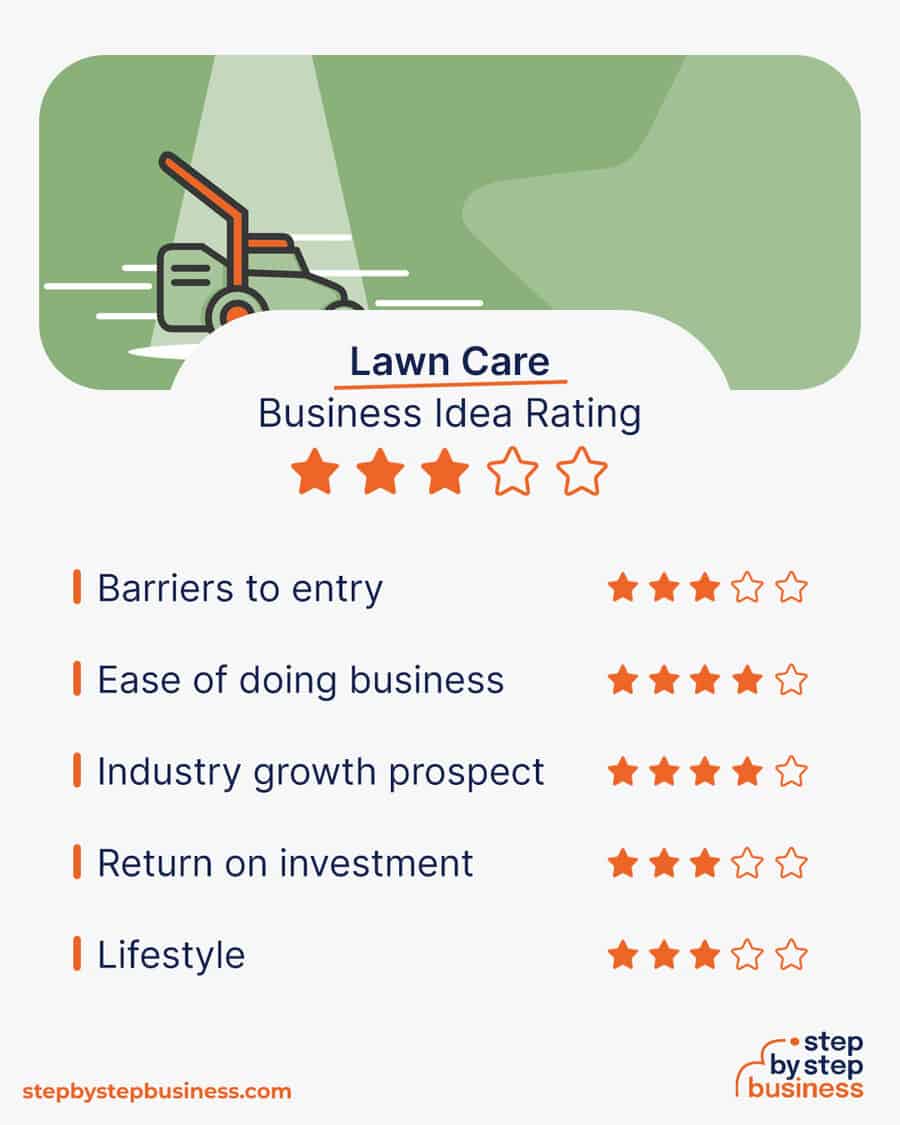

The first step is to determine if starting a lawn care business is viable for you. Think of this as a way to test the idea’s true potential, and you could start by weighing the pros and cons.
What are the downsides and upsides of launching a lawn care company? As a rule of thumb, a viable business idea should have more advantages than disadvantages.
Household spending on lawn care and gardening has risen in recent years and new millennial homeowners have increasingly valued the work of experienced lawn specialists. These trends have only increased despite the COVID-19 pandemic and recent recession. As a result of the economic downturn, the industry has experienced a labor shortage, potentially providing new opportunities for entrepreneurs.((https://nipgroup.com/landscaping-companies-labor-shortages/))
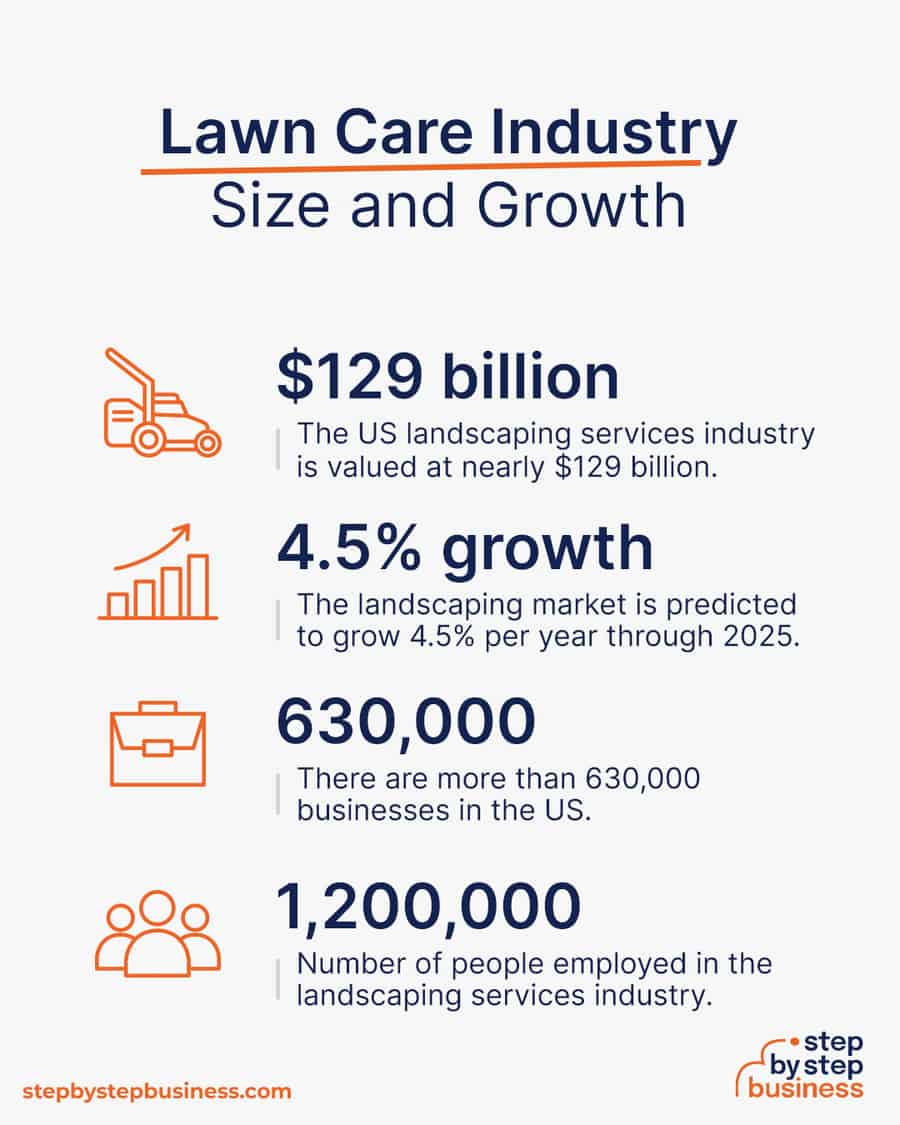
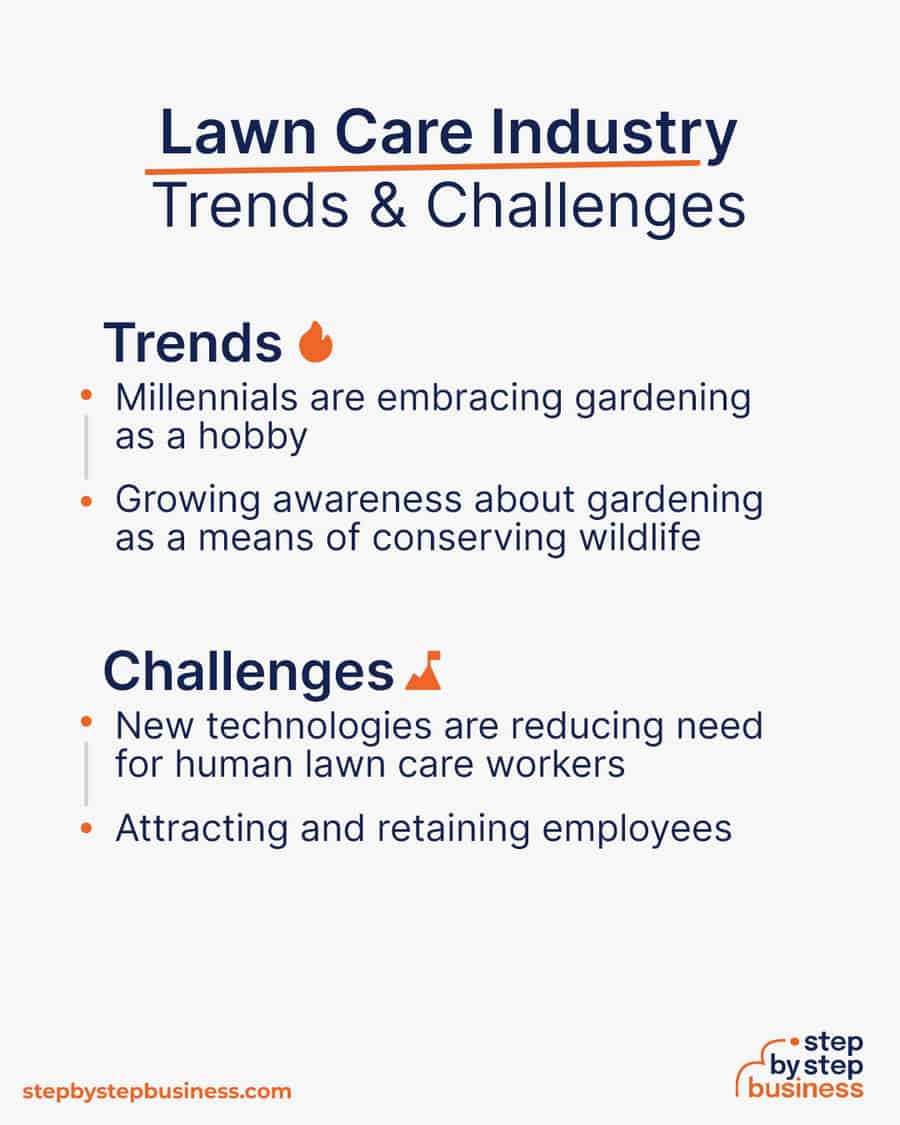
Trends in the lawn care industry include:
Challenges faced by the industry are:

Startup costs for a lawn care business range from about $5-$10,000, with the primary costs being your mower and lawn tools. Startups in this sector spend an average of about $7,500 to get their business up and running.
The extent of your primary investments into mowing equipment will depend in part on the size of the lawns you expect to manage. Your marketing costs, both physical (flyers and cards) and digital (social media, website), will vary depending on your strategy.
Eventually, you may need to invest in a truck and trailer to transport your equipment. Here’s a list of items to get you started:
| Startup Costs | Ballpark Range | Average |
|---|---|---|
| Equipment | $5,000 - $8,000 | $6,500 |
| Fuel | $30 - $60 | $45 |
| Insurance | $100 - $200 | $150 |
| Business license | $50 - $100 | $75 |
| Taxes | $25 - $50 | $38 |
| Website | $250 - $500 | $375 |
| Marketing Cost | $200 - $1,000 | $600 |
| Total | $5,655 - $9,910 | $7,783 |
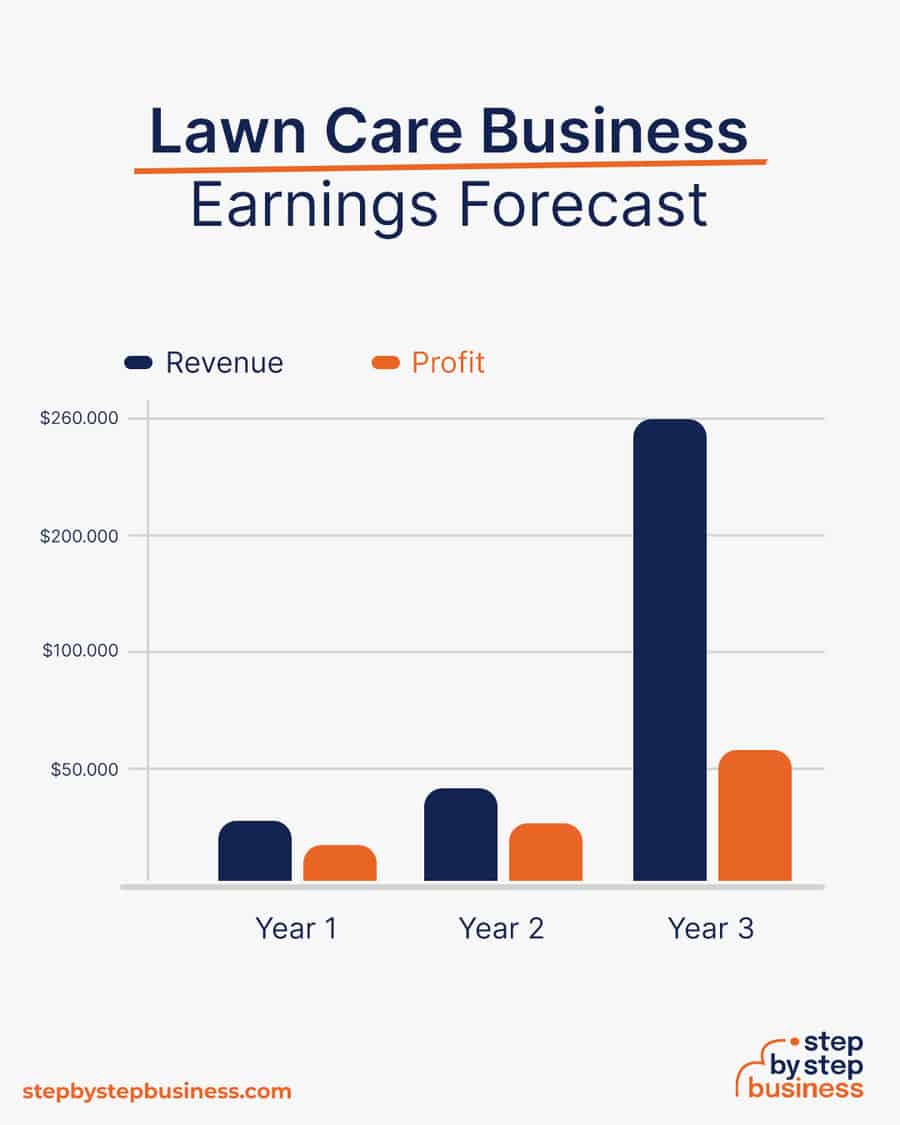
Lawn care business owners earn anywhere from $10,000 to $50,000 in their first couple of years. Profit margins are usually around 50-60%, as ongoing costs tend to be low. However, as a lawn care business expands, adding new machinery, workers, and vehicles, margins can fall below 20%.
Service pricing varies, mainly depending on lawn size. Per-session lawn care services often cost between $30 and $100. The computations below assume an average charge of $65 per session and that each lawn takes about 2 hours on average to complete.
In your first year, you could provide lawn care services to 7 clients a week, bringing in $24,000 in annual revenue. This would mean $14,000 in profit, assuming a 60% margin. As you gain experience, the number of homes you service could climb to 12 a week, bringing in $40,000 in annual revenue and $24,000 in profit.
As you gain more referrals and repeat customers, your work orders could further climb to 50 a week and you’re able to raise charges to $100 per session. At this stage, you’d hire workers and buy additional equipment, reducing your profit margin to around 20%. With annual revenue of $260,000, you’d make a tidy profit of $52,000.
Barriers to entry for a lawn care company are relatively moderate and depend on the season and economic reality. Significant challenges for new entrants include:

Now that you know what’s involved in starting a lawn care business, it’s a good idea to hone your concept in preparation to enter a competitive market.
Market research will give you the upper hand, even if you’re already positive that you have a perfect product or service. Conducting market research is important, because it can help you understand your customers better, who your competitors are, and your business landscape.
The next step involves validating your business idea. At this stage, you’ll want to determine if there’s demand for your services in the market. That way, you can project whether your target customers will buy your service offering. It also enables you to forecast whether your business will be profitable.
A good starting point is to research your local market to identify opportunities.
You should determine what type of service you can provide in relation to what your potential customer base demands, and what has worked for other providers. Your success may depend on your ability to market yourself, as the weeding, trimming, or gardening specialist, for instance. The most successful lawn care businesses might include all these services.
Many homeowners will rely on your primary service, lawn mowing, because such work is hard, particularly on hot summer days. But if your services are too one-dimensional, customers with diverse needs are likely to look elsewhere. In general, you should always take into account your target customer’s desires when developing your business plan.
Read how John Garretson skillfully navigated the world of lawn care franchising to build a successful business.
Lawn care specialists can provide a variety of services. The extent of your work will depend on your preference, skill, and equipment, as well as the needs of your target demographic. Below is a list of services a lawn care specialist may be expected to provide:
As a prospective lawn care specialist service, you should consider the necessary equipment and expected profit margins you can reasonably expect to earn for each of these services. Remember, as a service professional, your time is as valuable as your money. You should choose your service offerings wisely and, after some experimentation, add or subtract services as needed.
For each lawn cut, US prices range from about $30 to $100 depending on lawn size, with the average around $65. For other services, such as weeding, fertilizing, mulching, and gutter cleaning, you should consider a per-project fee or hourly rate, depending on which works better for you. You may even adjust your prices to consider not just the time required but also the level of physical difficulty of each service.
Another option is to charge a flat fee for a package of services, such as mowing, plus weeding, fertilizing, leaf removal, and gutter cleaning all in one go. This could boost revenue and encourage customer interest in services they had not previously considered.
Once you know your costs, you can use this Step By Step profit margin calculator to determine your mark-up and final price points. Remember, the prices you use at launch should be subject to change if warranted by the market.
As a lawn care service provider, your main target market is residential homeowners with lawns. Commercial properties such as office buildings and private schools may also be interested in your services. You may choose to focus on homes or businesses, or target both.
You could purchase larger equipment and specialize in bigger lawns, with higher expected earnings as a result. Keep in mind that a new push mower often costs less than $400, while a riding mower, which most larger lawns would require, will run you a cool $2,500 or more.
In the early stages, you may want to run your business from home to keep costs low. But as your business grows, you’ll likely need to hire workers for various roles and may need to rent out an office. You can find commercial space to rent in your area on sites such as Craigslist, Crexi, and Instant Offices.
When choosing a commercial space, you may want to follow these rules of thumb:

Here are some ideas for brainstorming your business name:
Once you’ve got a list of potential names, visit the website of the US Patent and Trademark Office to make sure they are available for registration and check the availability of related domain names using our Domain Name Search tool. Using “.com” or “.org” sharply increases credibility, so it’s best to focus on these.
Finally, make your choice among the names that pass this screening and go ahead with domain registration and social media account creation. Your business name is one of the key differentiators that sets your business apart. Once you pick your company name, and start with the branding, it is hard to change the business name. Therefore, it’s important to carefully consider your choice before you start a business entity.
Here are the key components of a business plan:

If you’ve never created a business plan, it can be an intimidating task. You might consider hiring a business plan specialist to create a top-notch business plan for you.
Registering your business is an absolutely crucial step — it’s the prerequisite to paying taxes, raising capital, opening a bank account, and other guideposts on the road to getting a business up and running.
Plus, registration is exciting because it makes the entire process official. Once it’s complete, you’ll have your own business!
Your business location is important because it can affect taxes, legal requirements, and revenue. Most people will register their business in the state where they live, but if you are planning to expand, you might consider looking elsewhere, as some states could offer real advantages when it comes to lawn care services.
If you’re willing to move, you could really maximize your business! Keep in mind, it’s relatively easy to transfer your business to another state.
Business entities come in several varieties, each with its pros and cons. The legal structure you choose for your lawn care business will shape your taxes, personal liability, and business registration requirements, so choose wisely.
Here are the main options:

We recommend that new business owners choose LLC as it offers liability protection and pass-through taxation while being simpler to form than a corporation. You can form an LLC in as little as five minutes using an online LLC formation service. They will check that your business name is available before filing, submit your articles of organization, and answer any questions you might have.
Choose Your State
The final step before you’re able to pay taxes is getting an Employer Identification Number, or EIN. You can file for your EIN online or by mail or fax: visit the IRS website to learn more. Keep in mind, if you’ve chosen to be a sole proprietorship you can simply use your social security number as your EIN.
Once you have your EIN, you’ll need to choose your tax year. Financially speaking, your business will operate in a calendar year (January–December) or a fiscal year, a 12-month period that can start in any month. This will determine your tax cycle, while your business structure will determine which taxes you’ll pay.
The IRS website also offers a tax-payers checklist, and taxes can be filed online.
It is important to consult an accountant or other professional to help you with your taxes to ensure you are completing them correctly.
Securing financing is your next step and there are plenty of ways to raise capital:
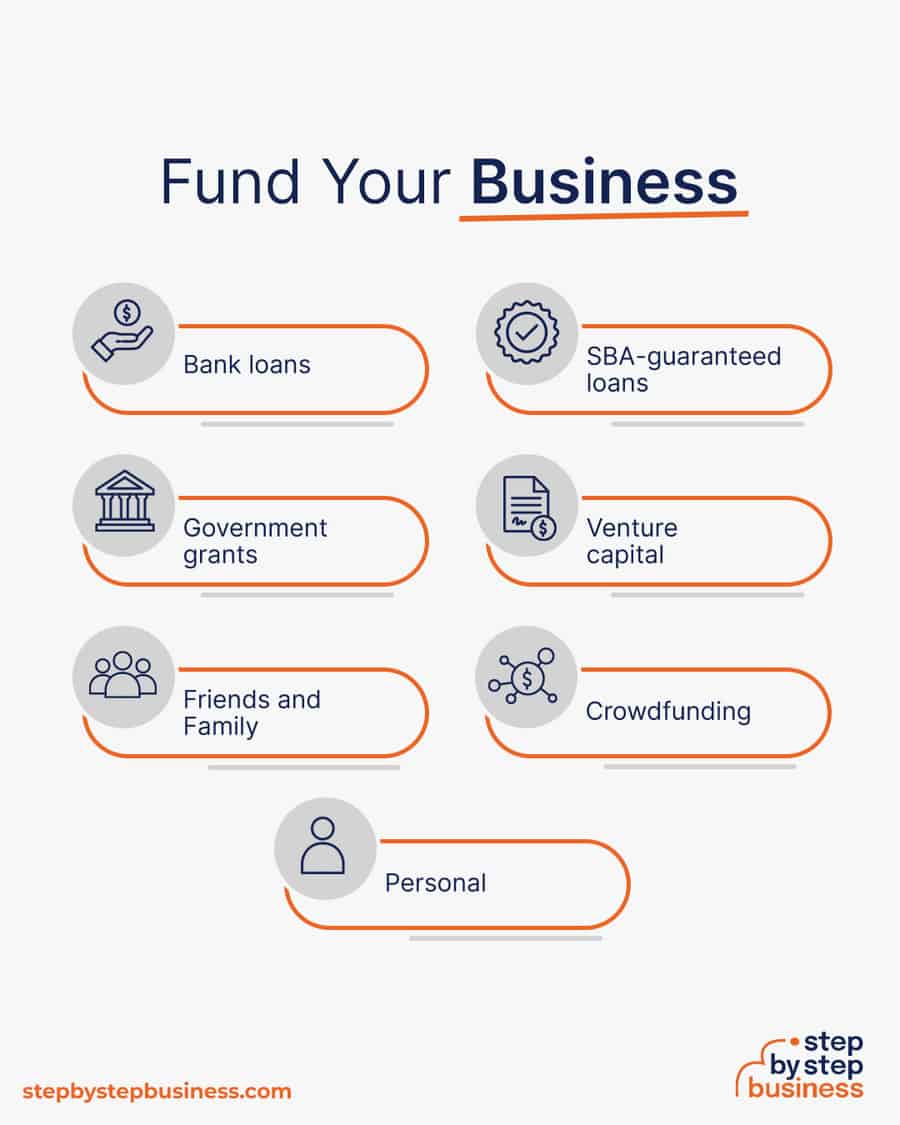
Bank and SBA loans are probably the best options, other than friends and family, for funding a lawn care business. You might also try crowdfunding if you have an innovative concept.

Starting a lawn care business requires obtaining a number of licenses and permits from local, state, and federal governments.
Federal regulations, licenses, and permits associated with starting your business include doing business as, health license and permit from the Occupational Safety and Health Administration (OSHA), trademarks, copyrights, patents, and other intellectual properties, as well as industry-specific licenses and permits.
Some of the lawn care-specific licenses and permits you may need to obtain include an occupational license or a Fertilizer/Pesticide Applicator Certification. The National Association for Landscape Professionals (NALP) offers optional certifications, for horticulture, lawn care management and more, which could enhance your marketability.
You may also need state-level and local county or city-based licenses and permits. The license requirements and how to obtain them vary, so check the websites of your state, city, and county governments or contact the appropriate person to learn more.
You could also check this SBA guide for your state’s requirements, but we recommend using MyCorporation’s Business License Compliance Package. They will research the exact forms you need for your business and state and provide them to ensure you’re fully compliant.
This is not a step to be taken lightly, as failing to comply with legal requirements can result in hefty penalties.
If you feel overwhelmed by this step or don’t know how to begin, it might be a good idea to hire a professional to help you check all the legal boxes.
Before you start making money, you will need a place to keep it, and that requires opening a bank account.
Keeping your business finances separate from your personal account makes it easy to file taxes and track your company’s income, so it’s worth doing even if you’re running your lawn care business as a sole proprietorship. Opening a business bank account is quite simple, and similar to opening a personal one. Most major banks offer accounts specifically for businesses, just inquire at your preferred bank to learn about their rates and features.
Banks vary in terms of offerings, so it’s a good idea to consider your options to choose the best plan that works for you. Once you choose your bank, you’ll need to bring your EIN (or Social Security Number if you decide on a sole proprietorship), articles of incorporation, and any other legal documentation that proves your business is registered.
Business insurance is an area that often gets overlooked yet is vital to your success as an entrepreneur. Insurance protects you from unexpected events that can have a devastating impact on your business.
Here are some types of insurance to consider:


As opening day nears, prepare for launch by reviewing and improving some key elements of your business.
Being an entrepreneur often means wearing many hats, from marketing to sales to accounting, which can be overwhelming. Fortunately, many websites and digital tools are available to help simplify many business tasks.
You may want to use industry-specific software, such as FreshDesk, WorkWave, and LawnPro, to manage work orders, communicate with customers, track billable hours, collect payments, and more.
Website development is crucial because your site is your online presence and needs to convince prospective clients of your expertise and professionalism.
You can create your own website using website builders. This route is very affordable, but figuring out how to build a website can be time-consuming. If you lack tech-savvy, you can hire a web designer or developer to create a custom website for your business.
They are unlikely to find your website, however, unless you follow Search Engine Optimization (SEO) practices. These are steps that help pages rank higher in the results of top search engines like Google.
Here are some powerful marketing strategies for your future business:

Unique selling propositions, or USPs, are the characteristics of a product or service that sets it apart from the competition. Customers today are inundated with buying options, so you’ll have a real advantage if they are able to quickly grasp how your lawn care services meet their needs or wishes. It’s wise to do all you can to ensure your USPs stand out on your website and in your marketing and promotional materials, stimulating buyer desire.
Global pizza chain Domino’s is renowned for its USP: “Hot pizza in 30 minutes or less, guaranteed.” Signature USPs for your lawn care business could be:
You may not like to network or use personal connections for business gain. But your personal and professional networks likely offer considerable untapped business potential. Maybe that Facebook friend you met in college is now running a lawn care business, or a LinkedIn contact of yours is connected to dozens of potential clients. Maybe your cousin or neighbor has been working in landscaping for years and can offer invaluable insight and industry connections.
The possibilities are endless, so it’s a good idea to review your personal and professional networks and reach out to those with possible links to or interest in lawn care. You’ll probably generate new customers or find companies with which you could establish a partnership. Online businesses might also consider affiliate marketing as a way to build relationships with potential partners and boost business.

You may not need to hire any employees if you are starting out small and using your home as your office. But as your business grows, you will need to add employees for various roles, including:
At some point, you may need to hire all of these positions or simply a few, depending on the size and needs of your business. You might also hire multiple workers for a single role or a single worker for multiple roles, again depending on need.
Free-of-charge methods to recruit employees include posting ads on popular platforms such as LinkedIn or Facebook. You can also use free classified sites like Jobs and AngelList. You might also consider a premium recruitment option, such as advertising on Indeed, Glassdoor, or ZipRecruiter. Further, if you have the resources, you could consider hiring a recruitment agency to help you find talent.

You’re now ready to start your entrepreneurial journey as a lawn care services provider. Keep in mind, you’re entering a highly competitive market so it’s important that you can offer value-added services aside from basic lawn moving and maintenance. You’ll also be competing with other providers that may use robots to cut grass, so it’s a good idea to keep yourself updated with the latest technologies in order to compete.
As long as there are homeowners who want to beautify their patios and yards, you should be able to grow your business and enjoy a steady stream of income. Good luck!

Published on December 1, 2022
Even with the lifting of pandemic lockdowns, many people still choose to stay and work from home. So if you’re thinking about ways to earn moneyfr ...
Read Now

Published on December 1, 2022
Do you have a sizable backyard? You might be able to turn it into some serious cash flow, especially since starting a business at home reduces youro ...
Read Now

Published on July 29, 2022
Just about everybody wants to live in a warm, welcoming close-knit community, and you can help build one by starting a business that helps peopleliv ...
Read Now
No thanks, I don't want to stay up to date on industry trends and news.
Comments